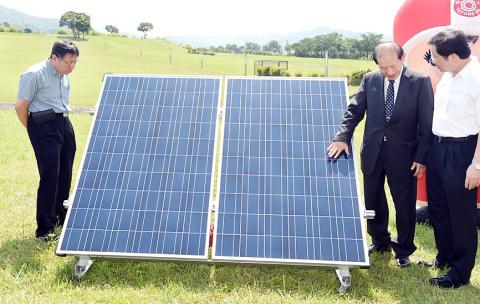Taipei is building its first solar power plant using ground-mounted solar panels at a former landfill, the city government said yesterday.
The project is part of the capital’s efforts to expand the use of renewable energy.
The Taipei Department of Environmental Protection yesterday signed a contract with Taipei-based Tatung, one of Taiwan’s leading brands for energy saving and “green” energy-related systems and services, at a ceremony at Fudekeng Environmental Restoration Park (福德坑復育公園), where the solar power plant is to be built.

Photo: Liao Chen-huei, Taipei Times
The 37 hectare park in the Muzha (木柵) area on the southeastern edge of the city used to be a landfill.
The solar power plant is expected to be completed by the end of this year and is to be able to generate up to 2 million kilowatt-hours of electricity per year, the Taipei Department of Environmental Protection said.
Speaking at the ceremony, Taipei Mayor Ko Wen-je (柯文哲) said that renewable energy sources generate about 487 million kilowatt-hours of electricity for Taipei, which accounts for only 3 percent of the city’s total power consumption.
The city is aiming to increase the contribution by renewable energy sources to 10 percent of its total power generation by the end of 2025, Ko said.
To that end, the city government is to use public land to develop solar power systems and will also subsidize the private sector to install solar power facilities to encourage wider use of solar energy, Ko said.
The new plant is expected to cut 18,905 tonnes of carbon emissions in the city annually, the department said.
The park is spacious and receives sufficient sunlight, department Commissioner Liou Ming-lone (劉銘龍) said, citing the latter as one of the reasons that it was chosen as the location for the plant.

ANOTHER EMERGES: The CWA yesterday said this year’s fourth storm of the typhoon season had formed in the South China Sea, but was not expected to affect Taiwan Tropical Storm Gaemi has intensified slightly as it heads toward Taiwan, where it is expected to affect the country in the coming days, the Central Weather Administration (CWA) said yesterday. As of 8am yesterday, the 120km-radius storm was 800km southeast of Oluanpi (鵝鑾鼻), Taiwan’s southernmost tip, moving at 9kph northwest, the agency said. A sea warning for Gaemi could be issued tonight at the earliest, it said, adding that the storm is projected to be closest to Taiwan on Wednesday or Thursday. Gaemi’s potential effect on Taiwan remains unclear, as that would depend on its direction, radius and intensity, forecasters said. Former Weather Forecast

As COVID-19 cases in Japan have been increasing for 10 consecutive weeks, people should get vaccinated before visiting the nation, the Centers for Disease Control (CDC) said. The centers reported 773 hospitalizations and 124 deaths related to COVID-19 in Taiwan last week. CDC Epidemic Intelligence Center Director Guo Hung-wei (郭宏偉) on Tuesday said the number of weekly COVID-19 cases reported in Japan has been increasing since mid-May and surpassed 55,000 cases from July 8 to July 14. The average number of COVID-19 patients at Japan’s healthcare facilities that week was also 1.39 times that of the week before and KP.3 is the dominant

The Chinese Communist Party’s (CCP) working group for Taiwan-related policies is likely to be upgraded to a committee-level body, a report commissioned by the Mainland Affairs Council (MAC) said. As Chinese President Xi Jinping (習近平) is increasingly likely to upgrade the CCP’s Central Leading Group for Taiwan Affairs, Taiwanese authorities should prepare by researching Xi and the CCP, the report said. At the third plenary session of the 20th Central Committee of the CCP, which ended on Thursday last week, the party set a target of 2029 for the completion of some tasks, meaning that Xi is likely preparing to

US-CHINA TRADE DISPUTE: Despite Beijing’s offer of preferential treatment, the lure of China has dimmed as Taiwanese and international investors move out Japan and the US have become the favored destinations for Taiwanese graduates as China’s attraction has waned over the years, the Ministry of Labor said. According to the ministry’s latest income and employment advisory published this month, 3,215 Taiwanese university graduates from the class of 2020 went to Japan, surpassing for the first time the 2,881 graduates who went to China. A total of 2,300 graduates from the class of 2021 went to the US, compared with the 2,262 who went to China, the document showed. The trend continued for the class of 2023, of whom 1,460 went to Japan, 1,334 went to